Submitted:
22 September 2023
Posted:
26 September 2023
You are already at the latest version
Abstract
Keywords:
1. Introduction
2. Materials and Methods
2.1. Data collection
2.2. Model development and implementation
2.2.1. Adaptive Neuro-Fuzzy Inference System modelling
2.2.2. Particle Swarm Optimization
2.2.3. Genetic Algorithm
2.2.4. Hybrid ANFIS-PSO modelling
2.2.5. Hybrid ANFIS-GA modelling
2.3. Procedure
3. Results and discussion
3.1. ANFIS
3.2. ANFIS-PSO
3.3. ANFIS-GA
4. Conclusion
- Delve into the influence of clustering techniques, varying parameters, and the intrinsic model parameters on the ANFIS approach’s performance.
- Thoroughly investigate the pivotal parameters of the hybrid ANFIS-PSO and ANFIS-GA models, discerning their impact on accurately forecasting the integrated solar combined cycle power plant’s performance.
Author Contributions
Funding
Institutional Review Board Statement
Informed Consent Statement
Data Availability Statement
Acknowledgments
Conflicts of Interest
References
- Baypai, P.; Dash, V. Hybrid renewable energy systems for power generation in stand-alone applications: A Review. Renewable and sustainable Energy Reviews 2012, 16, 2926–2939. [Google Scholar]
- Ibrahim, T.K.; Mohammed, M.K.; Awad, O.I.; Rahman, M.; Najafi, G.; Basrawi, F.; Alla, A.N.A.; Mamat, R. The optimum performance of the combined cycle power plant: A comprehensive review. Renew. Sustain. Energy Rev. 2017, 79, 459–474. [Google Scholar] [CrossRef]
- Tüfekci, P. Prediction of full load electrical power output of a base load operated combined cycle power plant using machine learning methods. Int. J. Electr. Power Energy Syst. 2014, 60, 126–140. [Google Scholar] [CrossRef]
- Kumar, R.; Hynes, N.R.J. Prediction and optimisation of surface roughness in thermal drilling using integrated ANFIS and GA approach. Engineering science and Technology, an International Journal 2020, 23, 30–41. [Google Scholar] [CrossRef]
- Zahraee, S.M.; Assadi, M.K.; Saidur, R. Application of Artificial Intellingence Methods for hybrid Energy System optimisation. Renewable and Sustenable Energy Reviews 2016, 66, 617–630. [Google Scholar] [CrossRef]
- Mosavi, A.; Salimi, M.; Ardabili, S.F.; Rabczuk, T.; Shamshirband, S.; Varkonyi-Koczy, A.R. State of the Art of Machine Learning Models in Energy Systems, a Systematic Review. Energies 2019, 12, 1301. [Google Scholar] [CrossRef]
- Sharifzadeh, M.; Sikinioti-Lock, A.; Shah, N. Machine-learning methods for integrated renewable power generation: A comparative study of artificial neural networks, support vector regression, and Gaussian Process Regression. Renew. Sustain. Energy Rev. 2019, 108, 513–538. [Google Scholar] [CrossRef]
- Rodríguez, M.B.R.; Rodríguez, J.L.M.; Fontes, C.d.H. Modeling of a Combined Cycle Gas Turbine (CCGT) Using an Adaptive Neuro-Fuzzy System. Therm. Eng. 2022, 69, 662–673. [Google Scholar] [CrossRef]
- Khosravi, A.; Malekan, M.; Pabon, J.J.G.; Zhao, X.; Assad, M.E.H. Design parameter modelling of solar power tower system using Adaptive neuro-fuzzy inference system optimized with a combination of genetic algorithm and teaching – based optimisation algorithm. Journal of cleaner Production 2020, 244, 118904. [Google Scholar] [CrossRef]
- Yaïci, W.; Entchev, E. Adaptive Neuro-Fuzzy Inference System modelling for performance prediction of solar thermal energy system. Renew. Energy 2016, 86, 302–315. [Google Scholar] [CrossRef]
- Zaaoumi, A.; Bah, A.; Alaoui, M.; Mechaqrane, A.; Berrehili, M. Application of artificial neural networks and adaptive neuro-fuzzy inference system to estimate the energy generation of a solar power plant in Ain Beni-Mathar (Morocco). Electronics, Computers and Artificial Intelligence (ECAI 2018) International conference. 28-30 June 2018, Iasi, Romania.
- Afzal, A.; Buradi, A.; Jilte, R.; Shaik, S.; Kaladgi, A.R.; Arıcı, M.; Lee, C.T.; Nižetić, S. Optimizing the thermal performance of solar energy devices using meta-heuristic algorithms: A critical review. Renew. Sustain. Energy Rev. 2023, 173, 112903. [Google Scholar] [CrossRef]
- Reyes-Belmonte, M.A.; Pino, F.J.; Romero, M.; Suarez, C.; Gongalez-Aguilar, J.; Guerro, J. Optimization of an Integrated solar combined cycle. AIP Conference Proceedings 2018, 2033, 210012. [Google Scholar]
- Achour, L.; Bouharkat, M.; Behar, O. Performance assessment of an integrated solar combined cycle in the southern of Algeria. Energy Rep. 2018, 4, 207–217. [Google Scholar] [CrossRef]
- Temraz, A.; Alobaid, F.; Link, J.; Elweteedy, A.; Epple, B. Development and validation of a Dynamic Simulation Model for an Integrated Solar Combined Cycle Power Plant. Energies 2021, 14, 3304. [Google Scholar] [CrossRef]
- Benabdellah, H.M.; Ghenaiet, A. Energy, exergy, and economic analysis of an integrated solar combined cycle power plant. Eng. Rep. 2021, 3, e12404. [Google Scholar] [CrossRef]
- Elmohlawy, A.E.; Ochkov, V.F.; Kazaudzhan, B.I. Evaluation of the performance and energy efficiency of integrated solar combined cycle power plant. Energy Sector Problems 2019, 21, 43–54. [Google Scholar] [CrossRef]
- Elmorsy, L.; Morosuk, T.; Tsatsaronis, G. Exergy-Based Analysis and Optimization of an Integrated Solar Combined-Cycle Power Plant. Entropy 2020, 22, 655. [Google Scholar] [CrossRef]
- Rashad, A.; Elweteedy, A.; Temraz, A.; Gomaa, A. Investigating an integrated solar combined cycle power plant. Global Journal of Engineering Sciences 2021, 1, 33552. [Google Scholar] [CrossRef]
- Dayem, A.A.; Metwally, M.N.; Alghamdi, A.; Marzouk, E. Numerical Simulation and Experimental Validation of Integrated Solar Combined Power Plant. Energy Procedia 2014, 50, 290–305. [Google Scholar] [CrossRef]
- Elmohlawy, A.E.; Ochkov, V.F.; Kazandzhan, B.I. Study and Prediction the Performance of an Integrated Solar Combined Cycle Power Plant. Energy Procedia 2019, 156, 72–78. [Google Scholar] [CrossRef]
- Available online: https://data.mendeley.com/datasets/crzxm8ggwn.
- Rovira, A.; Abbas, R.; Sánchez, C.; Muñoz, M. Proposal and analysis of an integrated solar combined cycle with partial recuperation. Energy 2020, 198, 117379. [Google Scholar] [CrossRef]
- Olayode, I.O.; Severino, A.; Tartibu, L.K.; Arena, F.; Cakici, Z. Performance Evaluation of a hybrid PSO Enhanced ANFIS Model in Prediction of Traffic Flow of Vehicles on Freeways: Traffic Data Evidence from South Africa. Infrastructures Infrastructures 2021, 7, 7010002. [Google Scholar] [CrossRef]
- Zayed, M.E.; Zhao, J.; Li, W.; Elsheikh, A.H.; Elaziz, M.A. A hybrid adaptive neuro-fuzzy inference system integrated with equilibrium optimizer algorithm for predicting the energetic performance of solar dish collector. Energy 2021, 235, 121289. [Google Scholar] [CrossRef]
- Kennedy, J.; Eberhart, R.C. Particle swarm optimisation. In the Proceedings of the 1995 IEEE International Conference on Neural Networks, Perth, Australia, 1942-1948. Piscataway, NJ: IEEE Service Center.
- Okwo, M. O.; Tartibu, L. K. Metaheuristic optimization: Nature-inspired algorithms swarm and computational intelligence, theory and applications. Springer Nature, 2020.
- Zolpakar, N.A.; Yasak, M.F.; Pathak, S. A review: use of evolutionary algorithm for optimisation of machining parameters. Int. J. Adv. Manuf. Technol. 2021, 115, 31–47. [Google Scholar] [CrossRef]
- Ceylan, Z.; Pekel, E.; Ceylan, S.; Bulkan, S. Biomass Higher Heating Value Prediction Analysis by ANFIS, PSO-ANFIS and GA-ANFIS. Global NEST Journal 2017, 20, 589–597. [Google Scholar]
- Rezakazemi, M.; Dashti, A.; Asghari, M.; Shiraziani, S. H2-Selective mixed matrix membranes modelling using ANFIS, PSO-ANFIS, GA-ANFIS. International Journal of Hydrogen Energy 2017, 42, 15211–15225. [Google Scholar] [CrossRef]
- Piotrowski, A. P.; Napiorkowski, J. J.; Piotrowska, A. E. Population size in particle swarm optimization. Swarm Evolutionary Computation 2020, 58, 100718. [Google Scholar] [CrossRef]
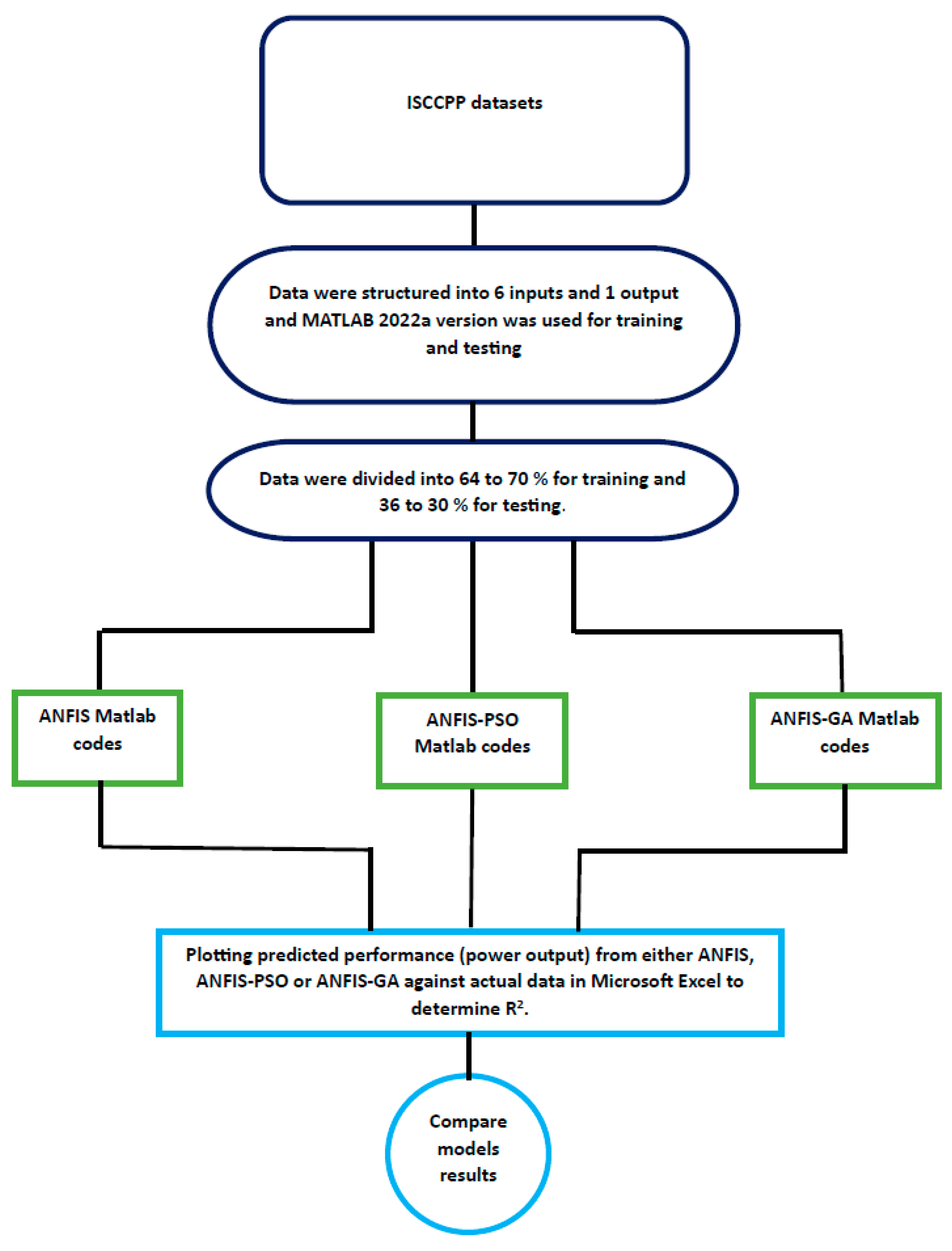
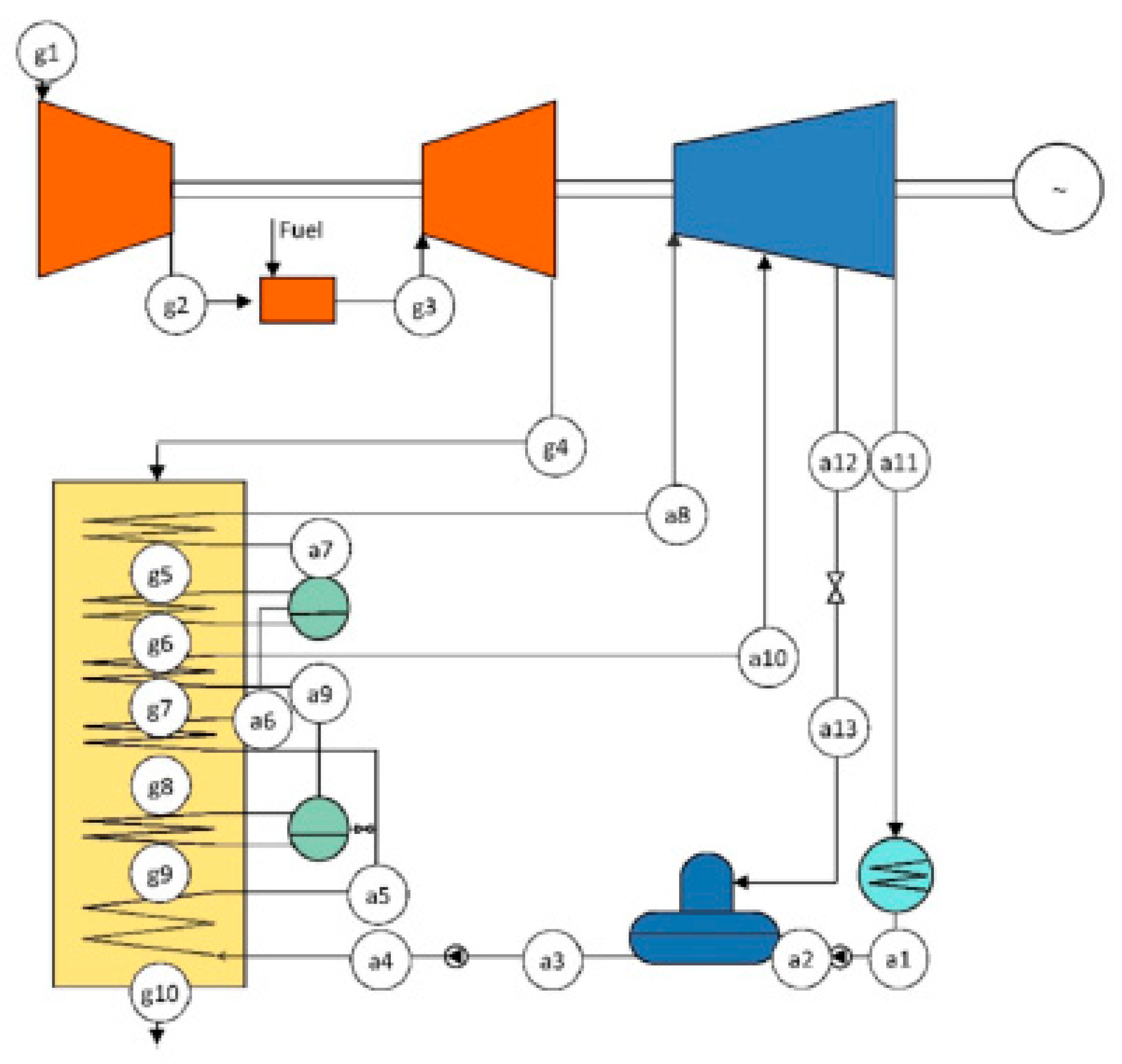
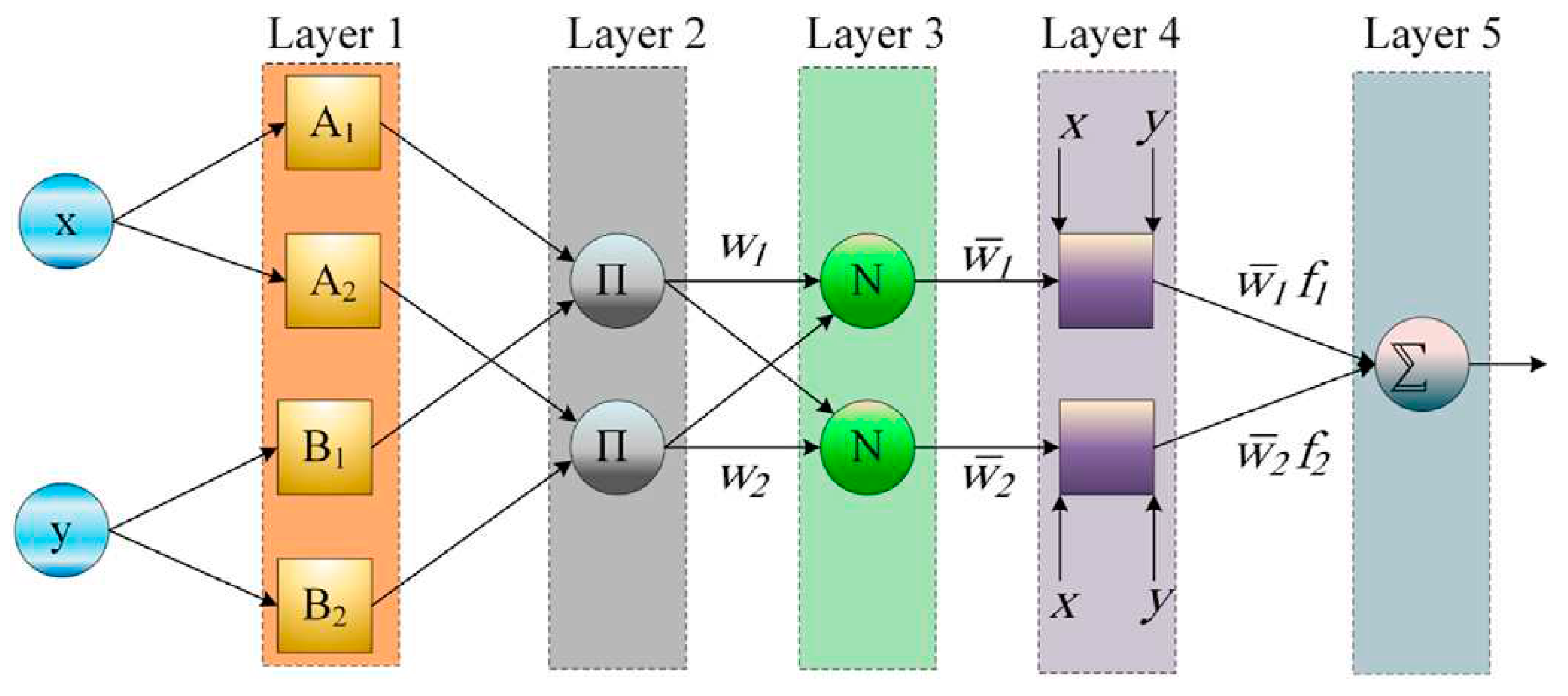
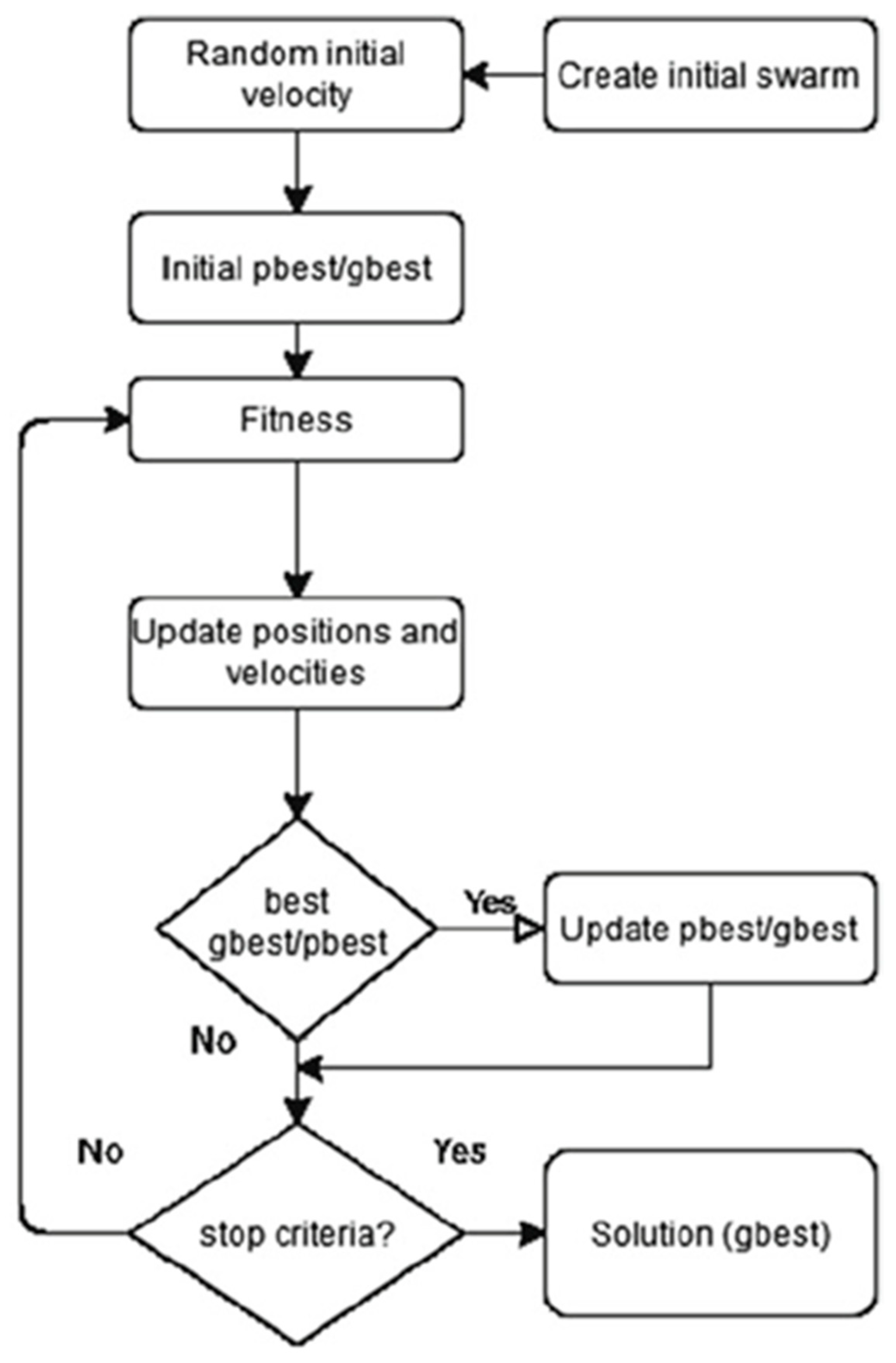
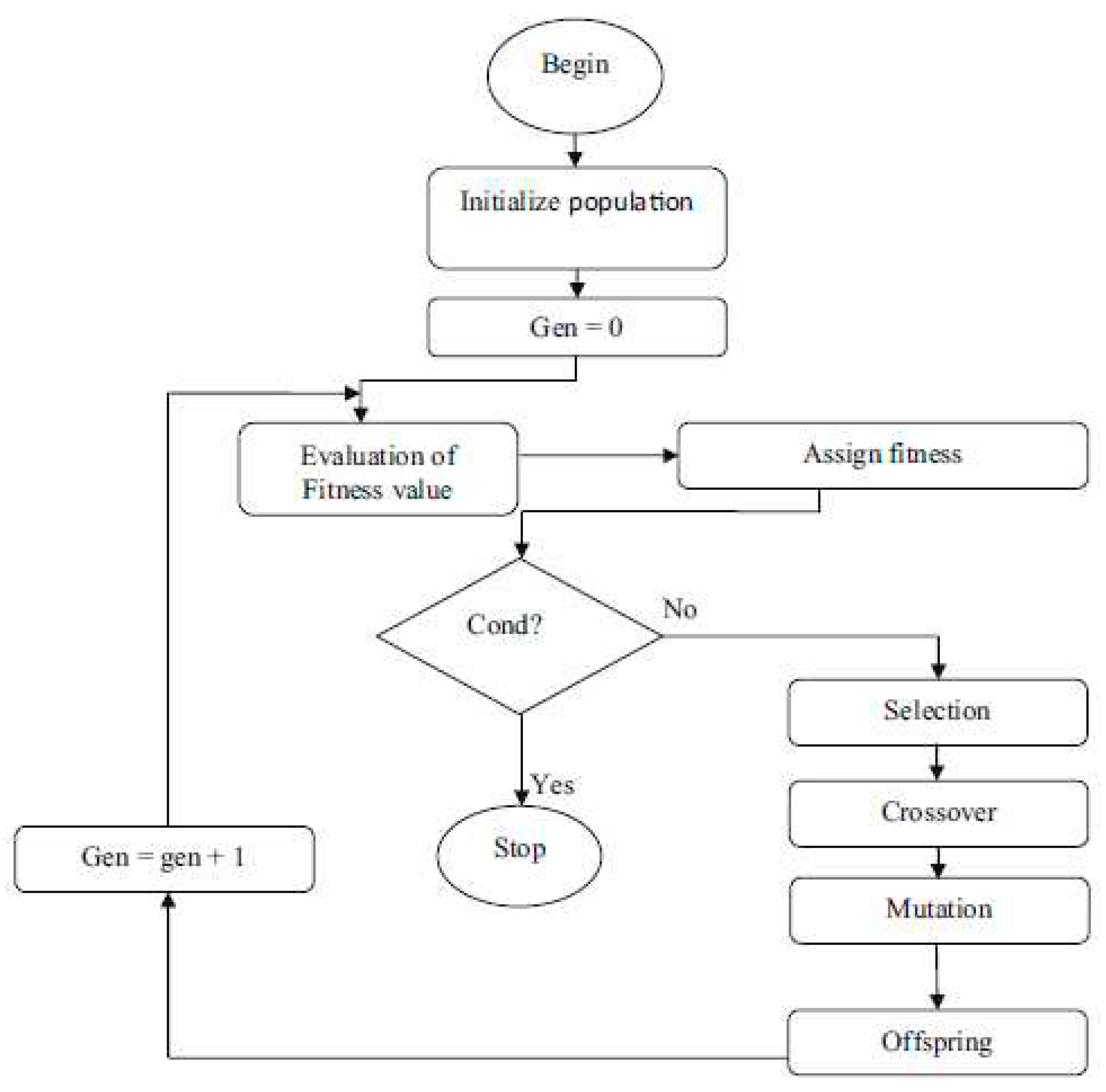
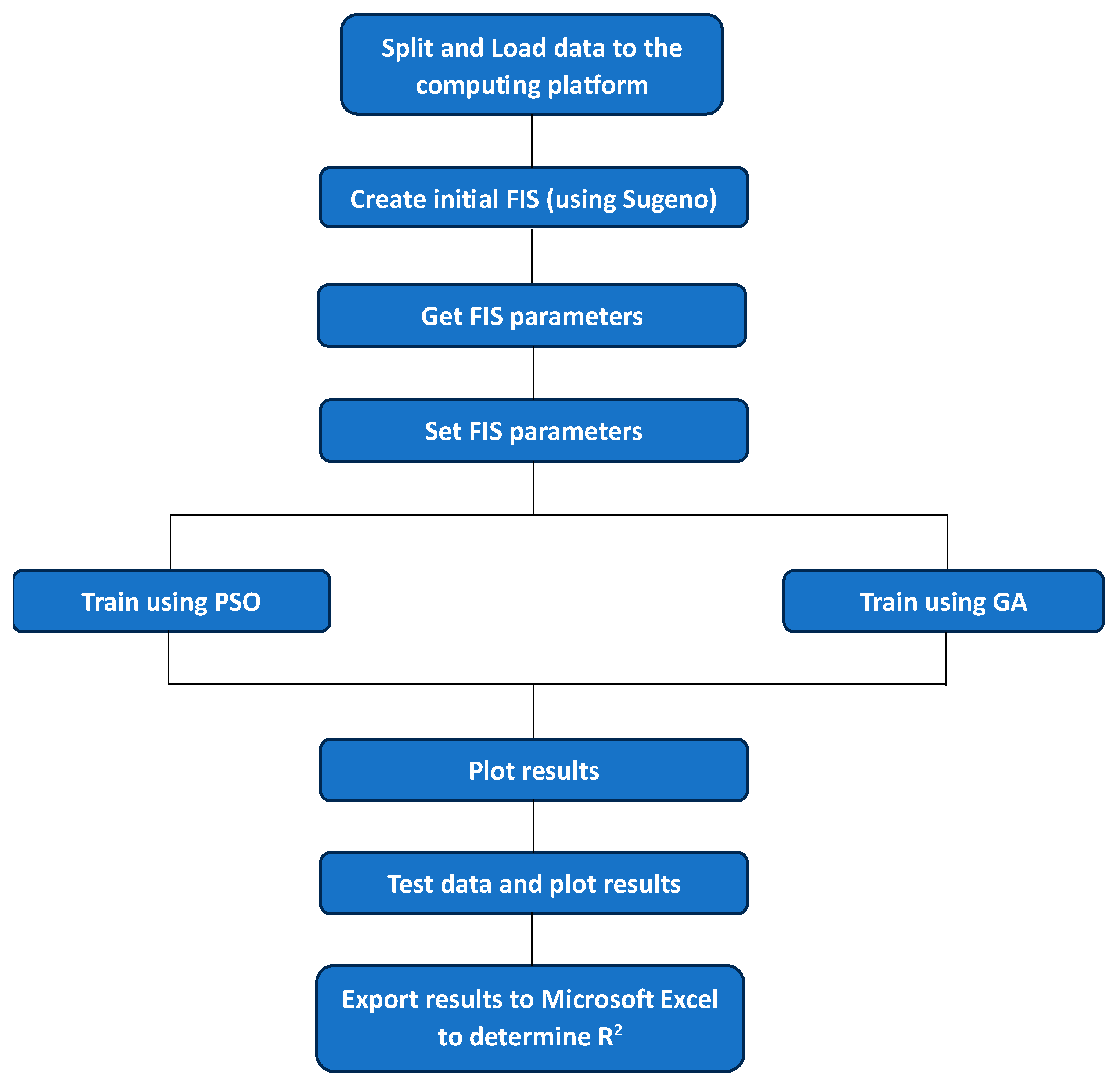
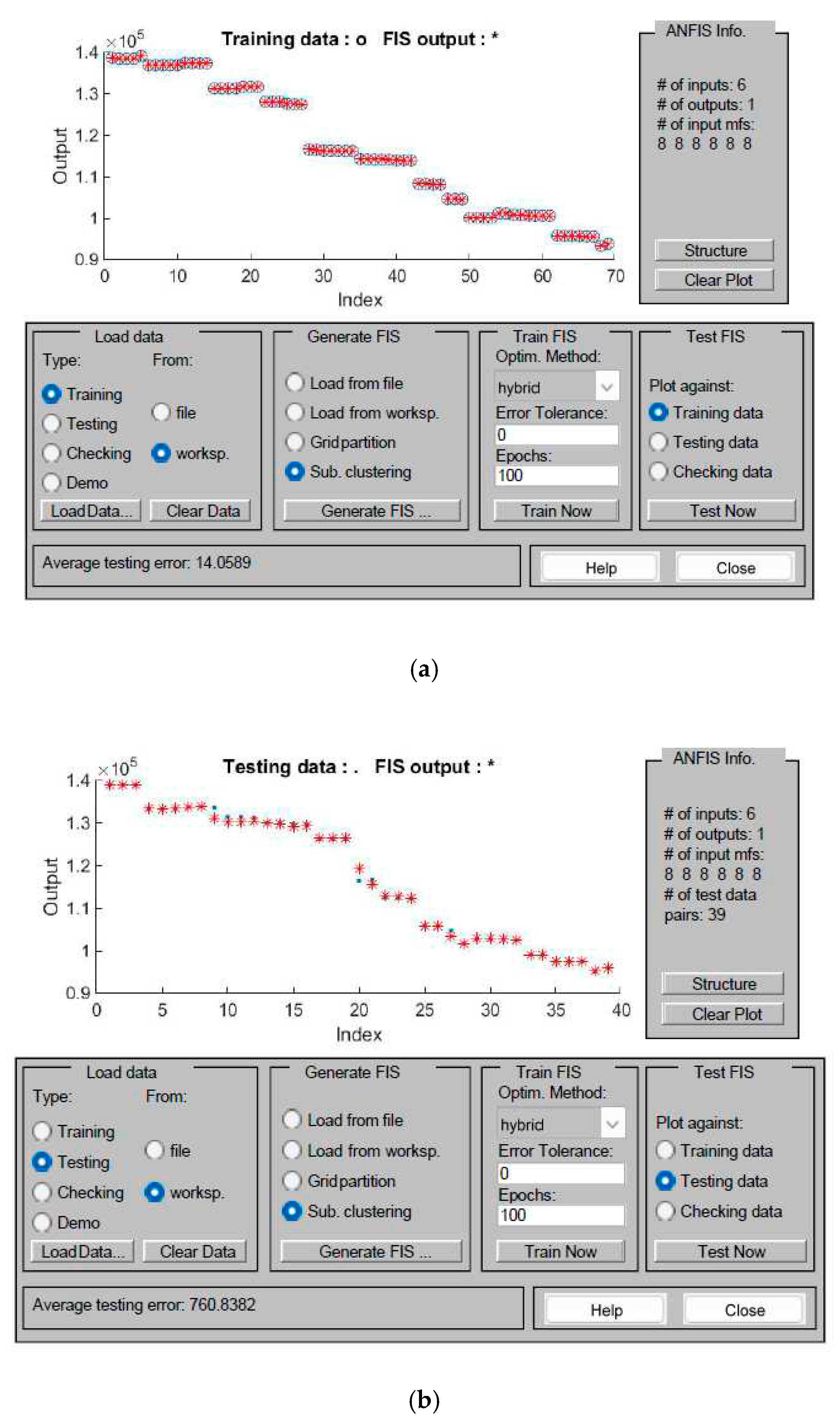
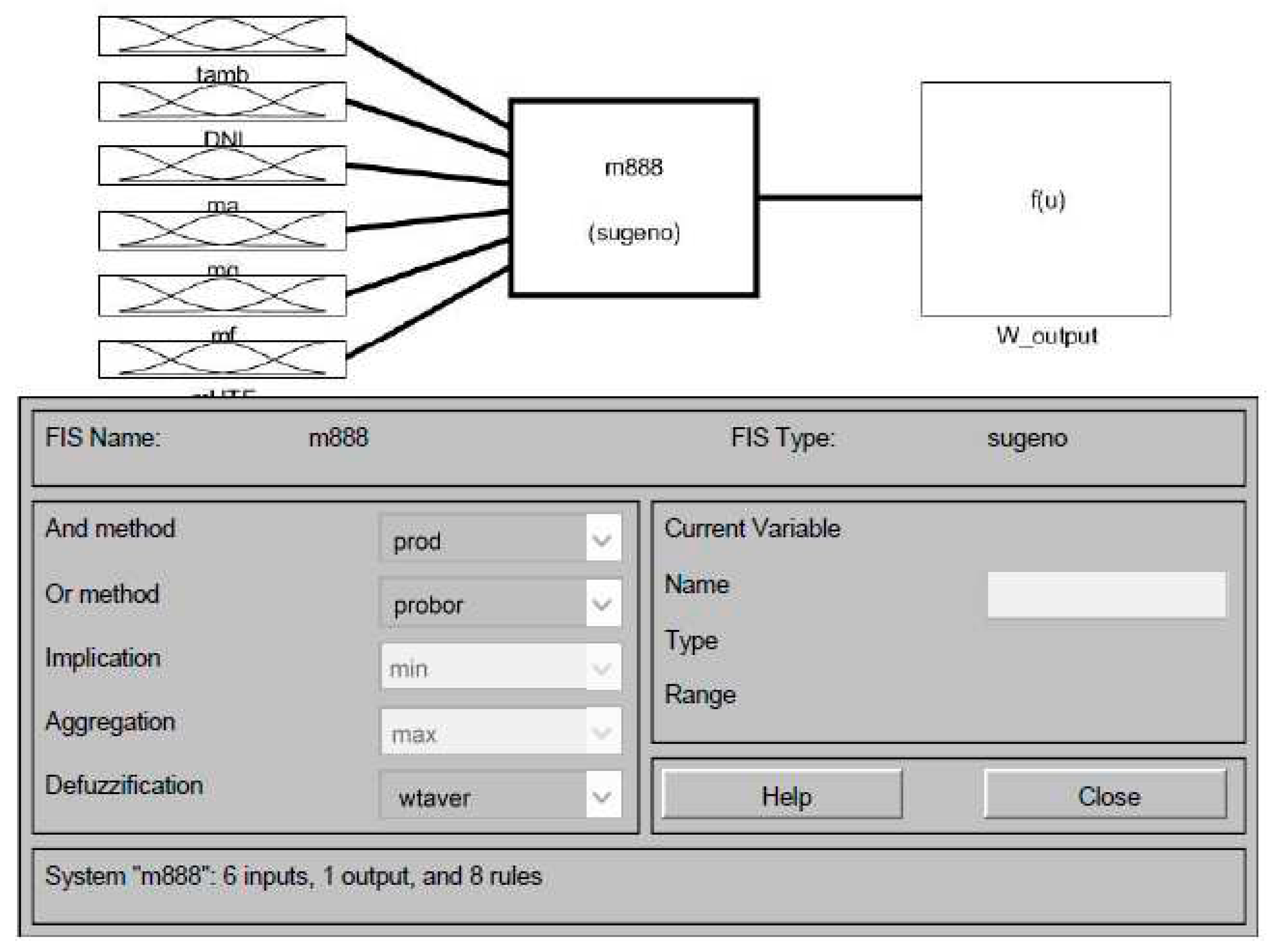
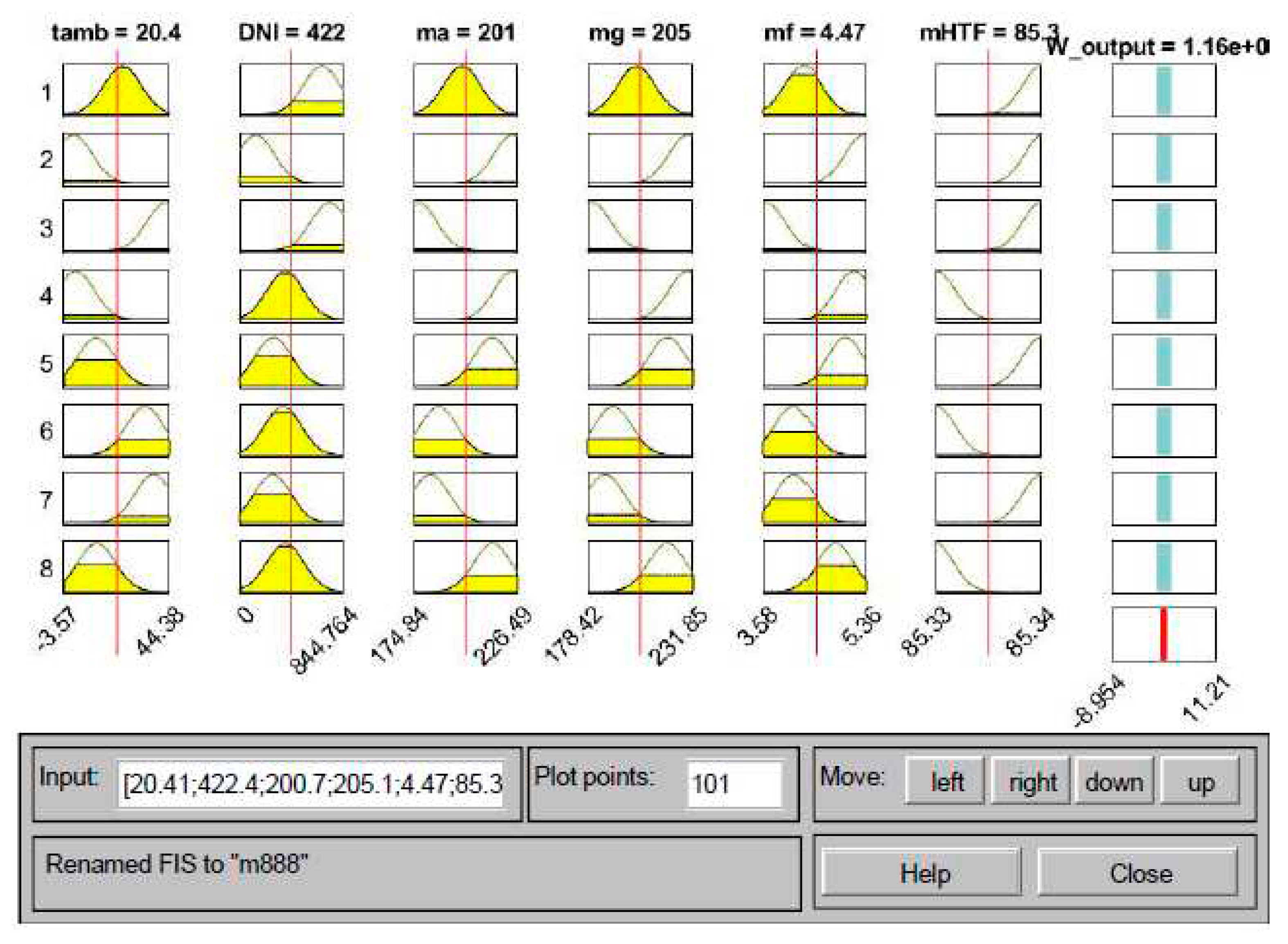
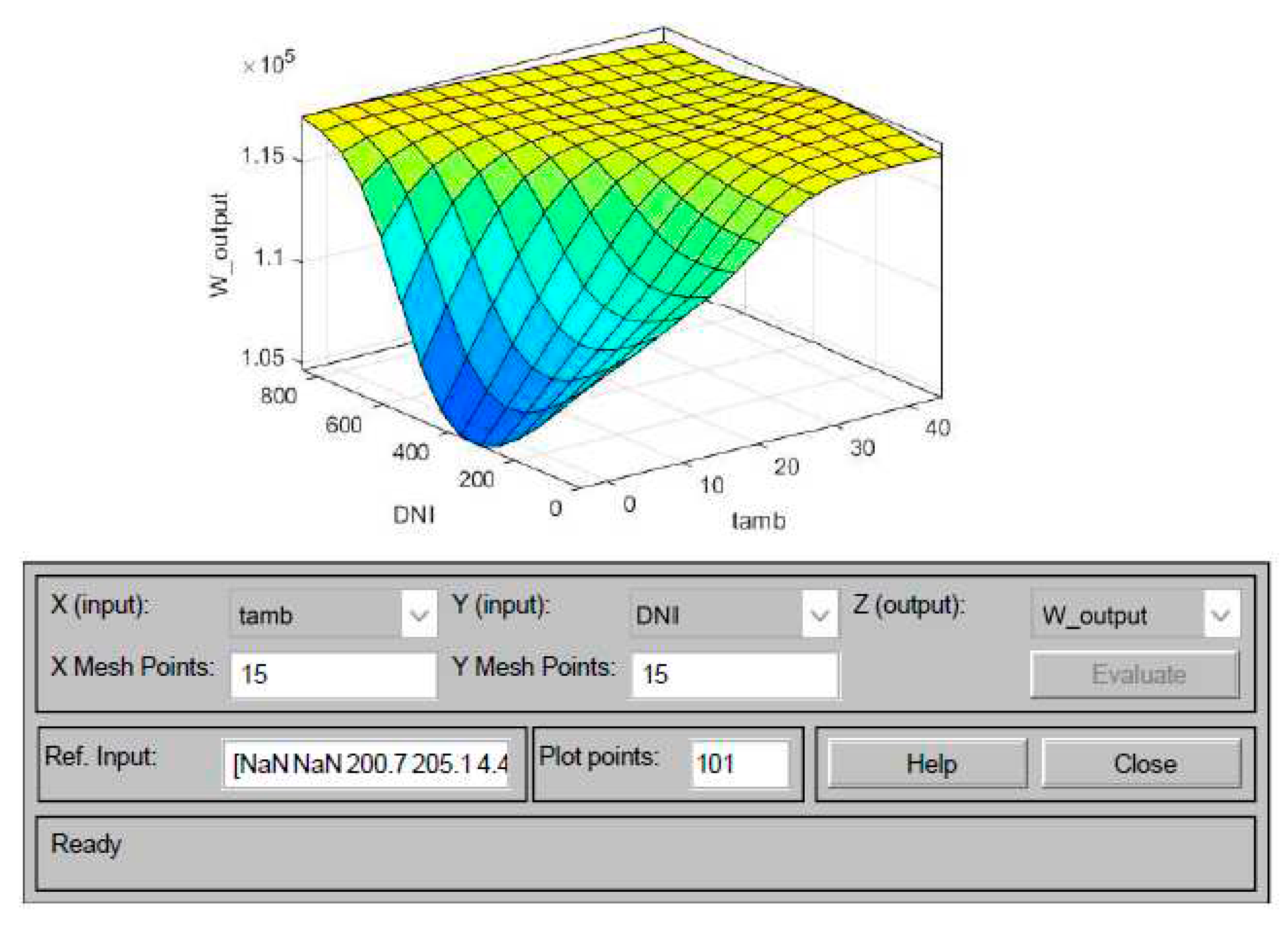
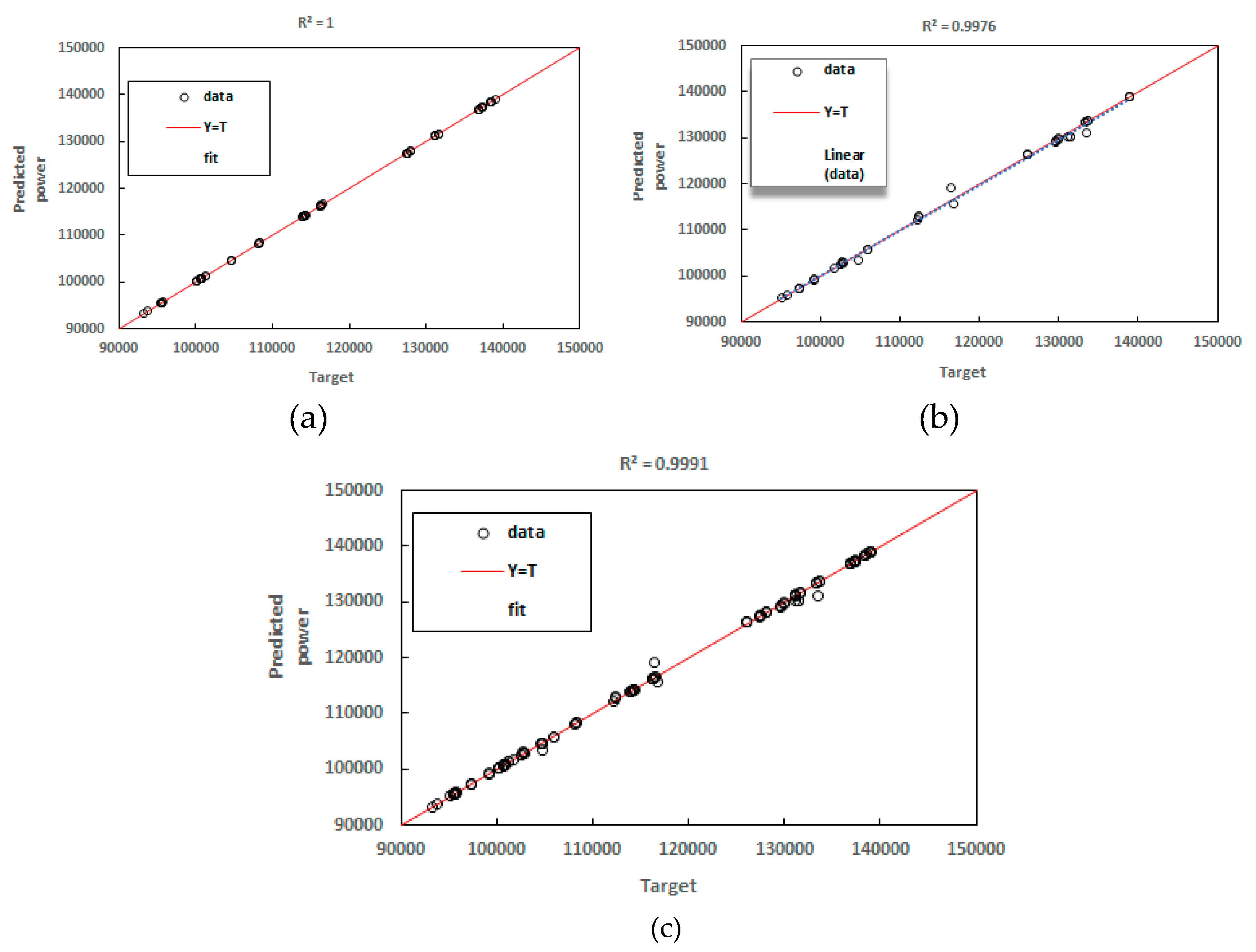
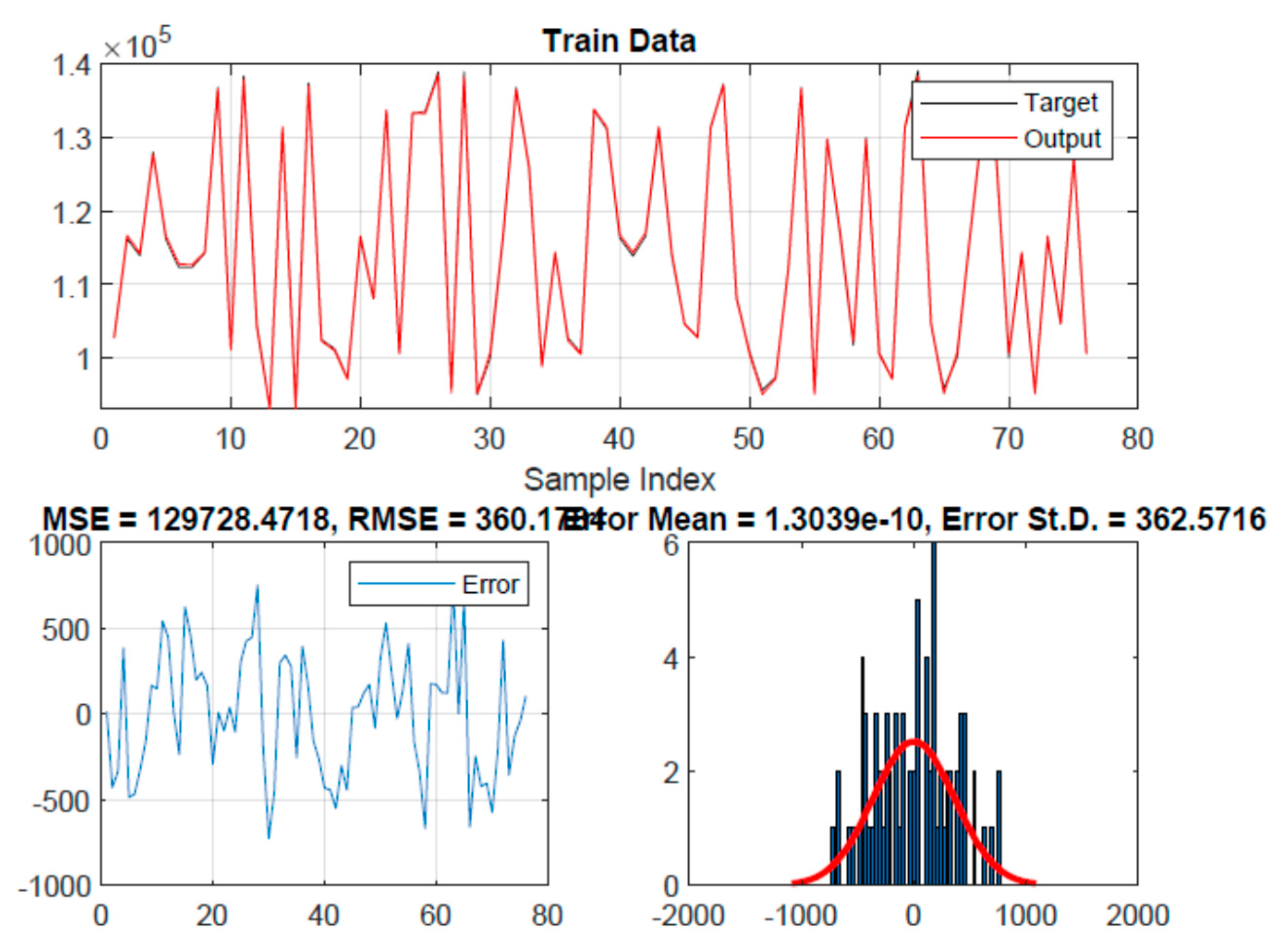
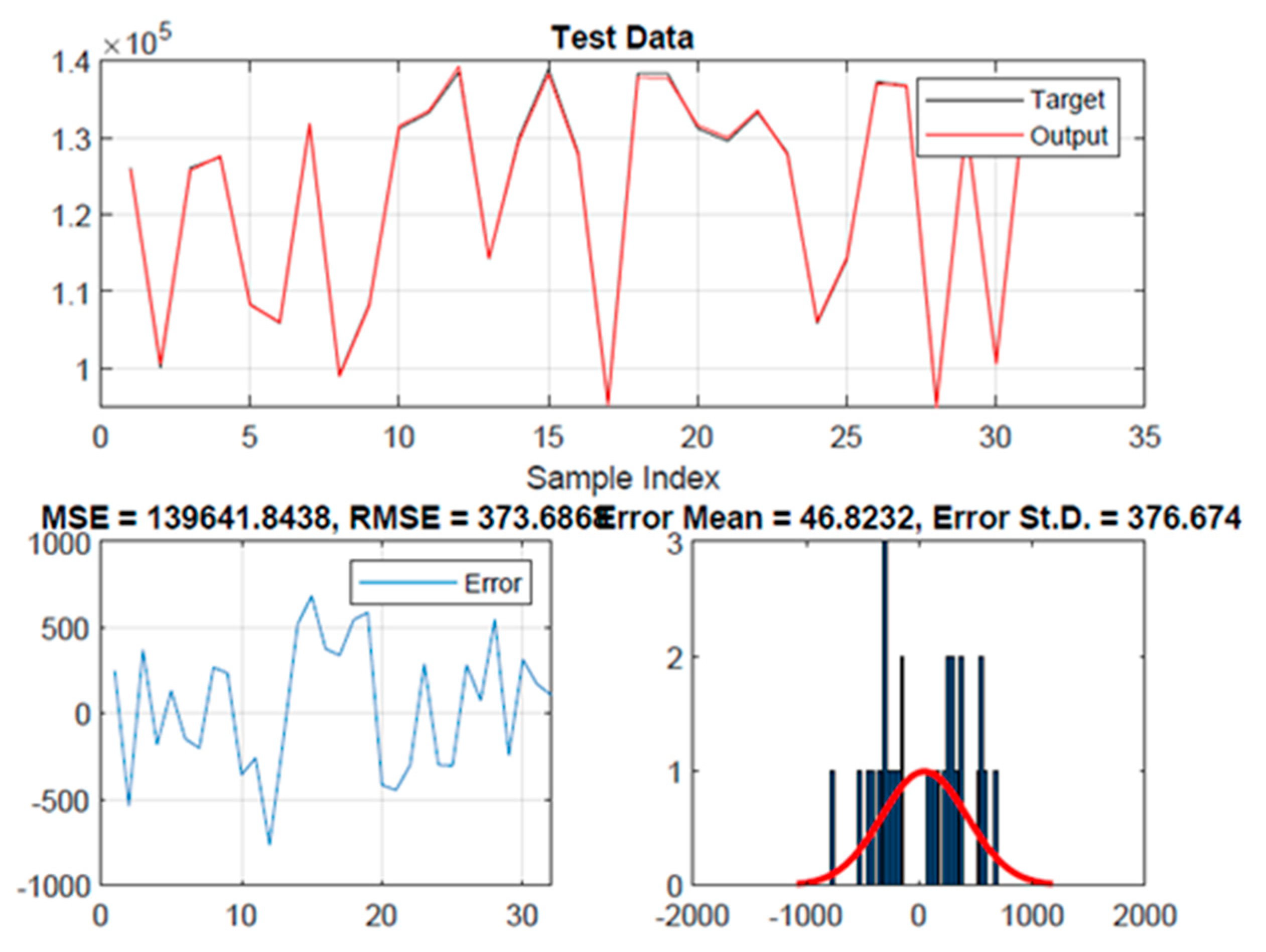
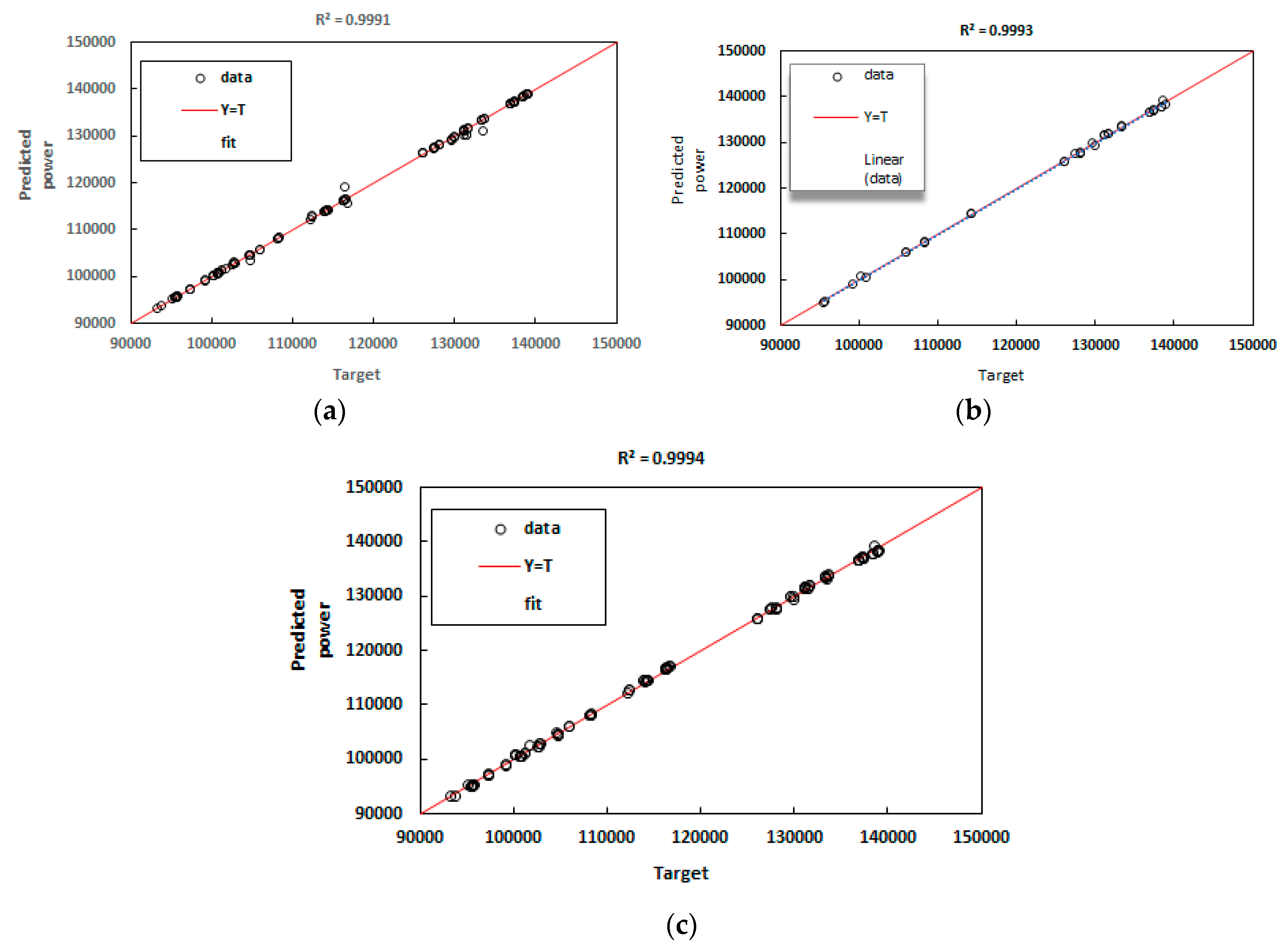
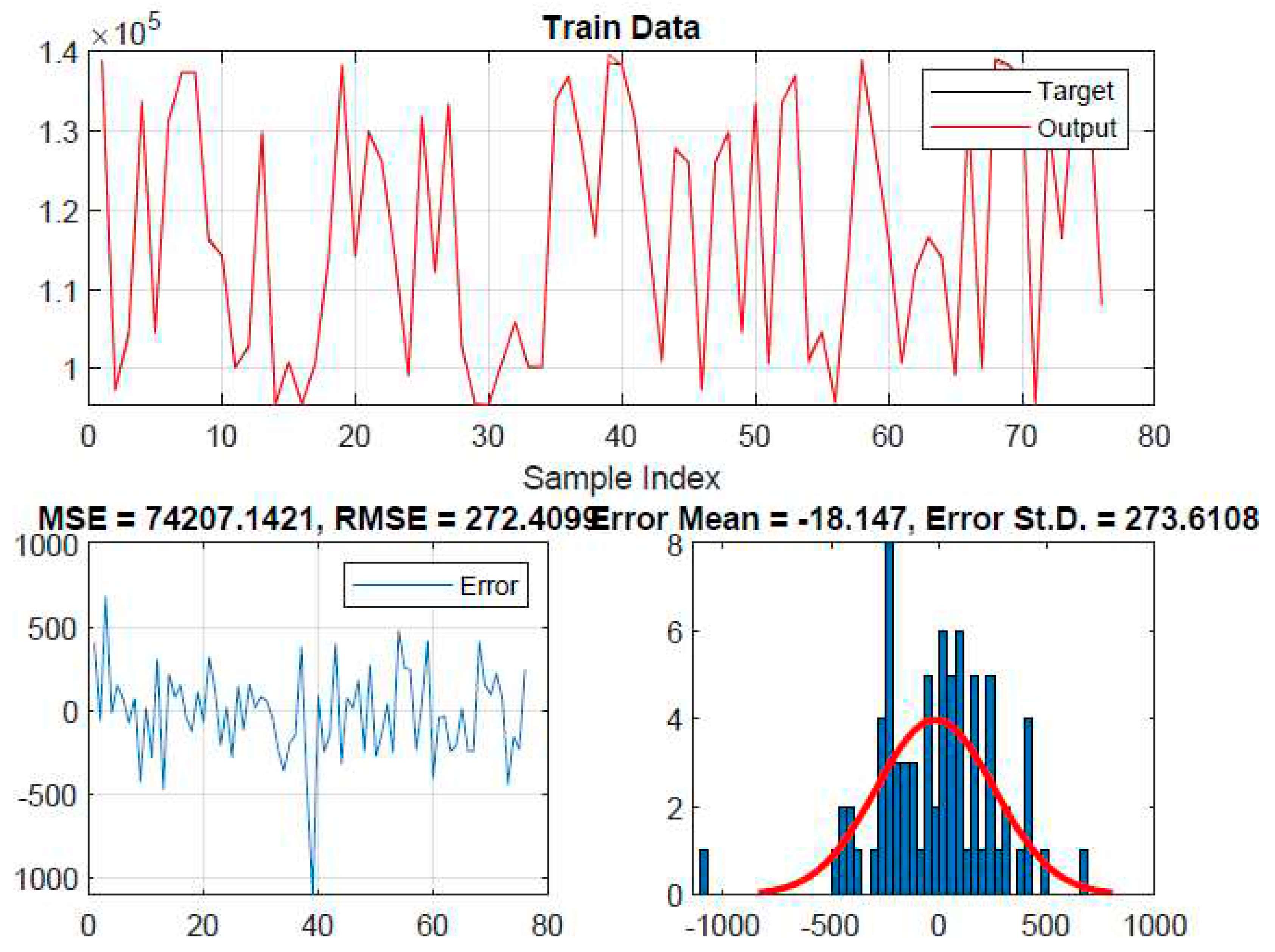
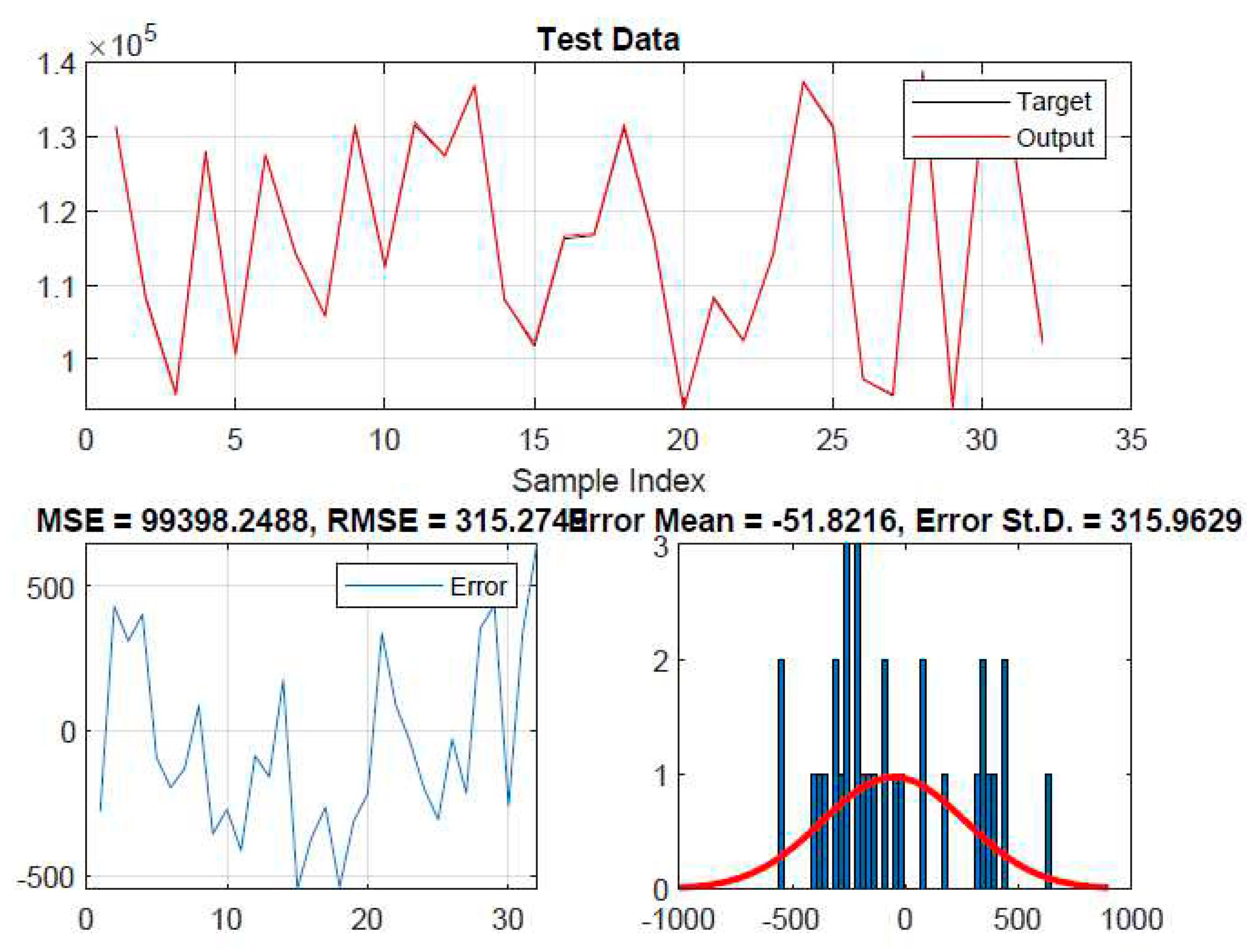
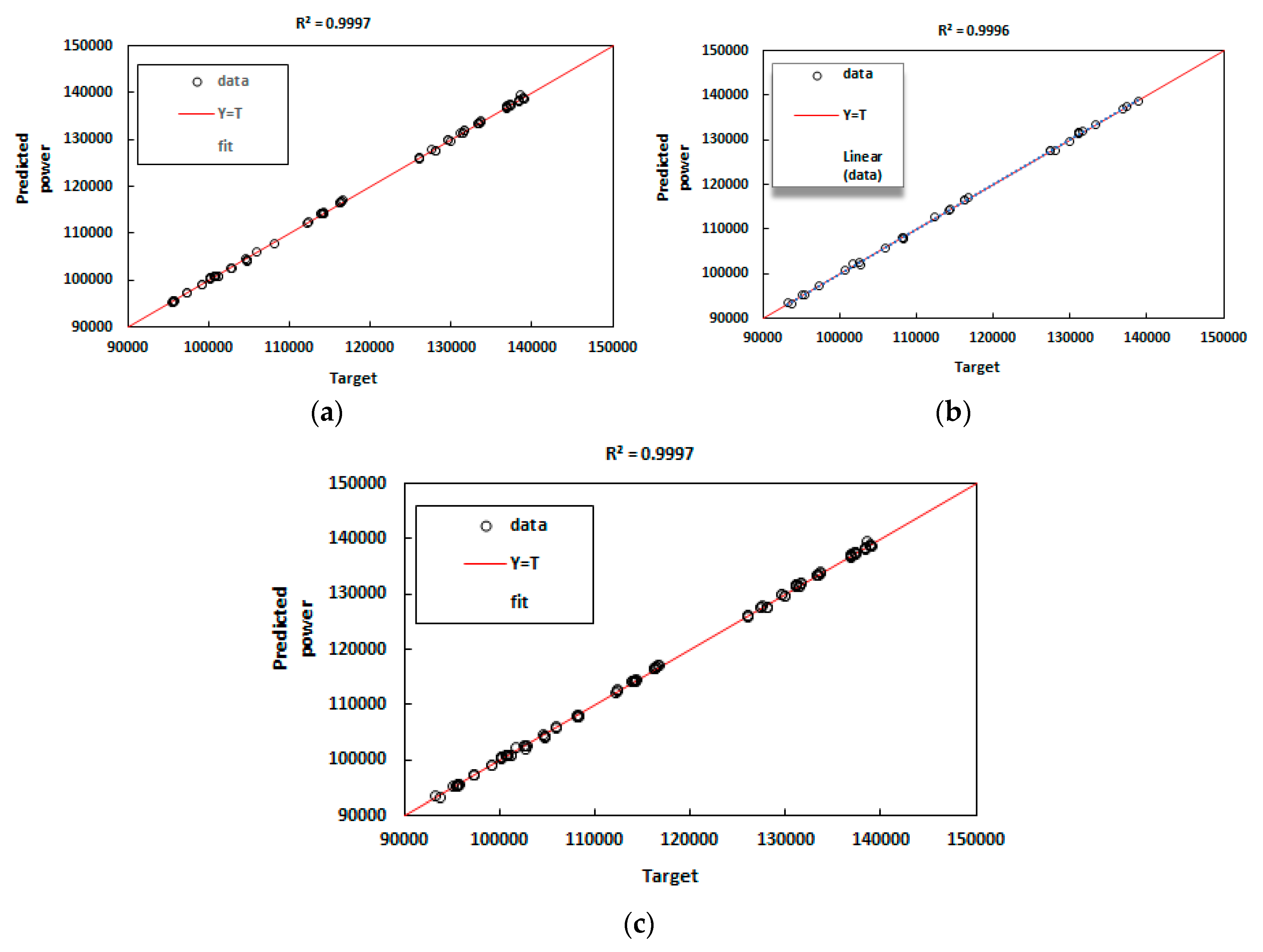
| tamb (⁰C) | DNI (w/m2) | ma (kg/s) | mg (kg/s) | mf (kg/s) | mHTF (kg/s) | Power output (kW) |
|---|---|---|---|---|---|---|
| 11.0767 | 162.547 | 214 | 219 | 5 | 85.34 | 128037.2 |
| 20.9667 | 749.527 | 201.47 | 205.76 | 4.3 | 85.34 | 116162.6 |
| 24.9233 | 447.82 | 196.51 | 200.81 | 4.3 | 85.33 | 112374.3 |
| 25.42 | 434.645 | 196.95 | 200.82 | 4.3 | 85.33 | 112389.7 |
| 22.9978 | 551.628 | 198.95 | 203.26 | 4.32 | 85.34 | 114308.4 |
| 0.61 | 88.15 | 223.85 | 229.14 | 5.29 | 85.34 | 136802.8 |
| 36.97 | 332.64 | 183.25 | 187.23 | 3.98 | 85.33 | 101213 |
| -0.61 | 64.63 | 225.16 | 230.5 | 5.34 | 85.34 | 138351.3 |
| 33.025 | 137.475 | 187.24 | 191.48 | 4.24 | 85.34 | 104705.4 |
| 44 | 0 | 174.84 | 178.72 | 3.88 | 85.34 | 93186.5 |
Disclaimer/Publisher’s Note: The statements, opinions and data contained in all publications are solely those of the individual author(s) and contributor(s) and not of MDPI and/or the editor(s). MDPI and/or the editor(s) disclaim responsibility for any injury to people or property resulting from any ideas, methods, instructions or products referred to in the content. |
© 2023 by the authors. Licensee MDPI, Basel, Switzerland. This article is an open access article distributed under the terms and conditions of the Creative Commons Attribution (CC BY) license (http://creativecommons.org/licenses/by/4.0/).





